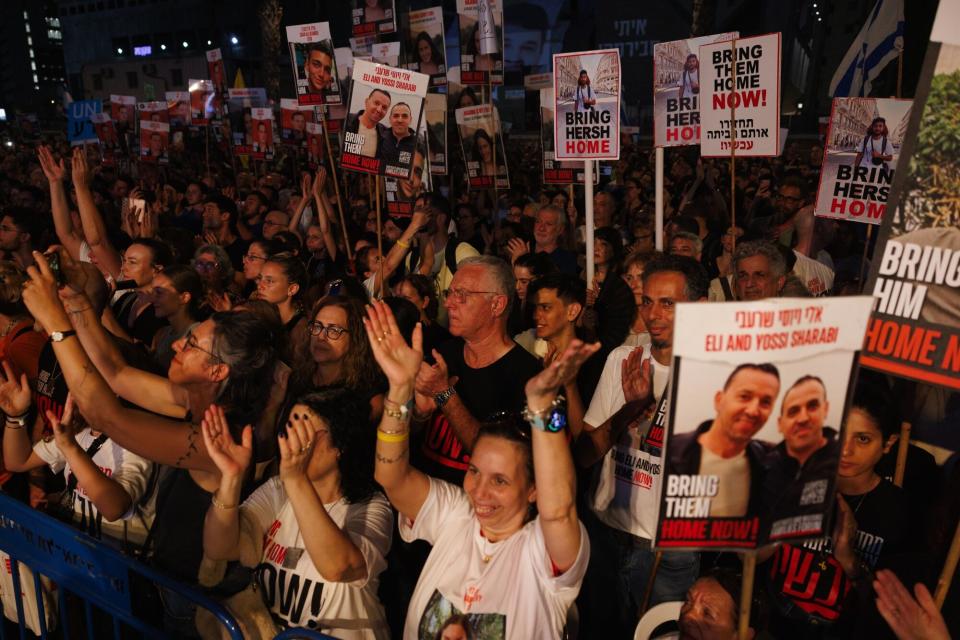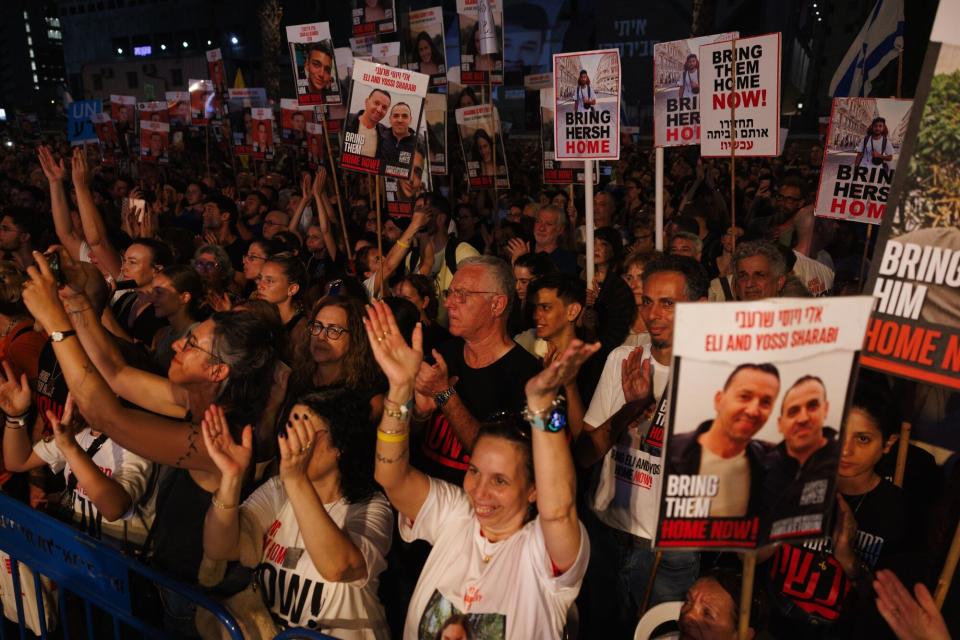Israelis Find Respite in Rescue But War’s Challenges Endure
(Bloomberg) -- They danced in the streets and cheered on the beaches as TV anchors teared up on camera. Saturday’s rescue of four hostages from central Gaza was a cause for rare and intense celebration in Israel, boosting Benjamin Netanyahu’s government and the beleaguered military eight months into a punishing war.
Most Read from Bloomberg
Russia Is Sending Young Africans to Die in Its War Against Ukraine
Macron Gambles on Snap French Election in Bid to Stop Le Pen
Putin Is Running Out of Time to Achieve Breakthrough in Ukraine
But it also highlighted operational limitations and a growing desire for a hostage deal, ultimately increasing pressure on the prime minister. Military spokesmen said the conditions for such a rescue — the four had been held in buildings aboveground rather than in tunnels — don’t exist for the other 100-plus Israelis held by Hamas, and the way to bring them home is through negotiation.
Tens of thousands of demonstrators took their usual places outside the defense ministry in Tel Aviv on Saturday night, and while there have been competing messages at recent rallies — anti-government versus pro-hostage — this week’s slogans converged around one theme: get a deal and bring them home.
“Victory will only be felt by the Israeli people when the remaining hostages are returned,” said Avi Melamed, a former Israeli intelligence officer. “It levies pressure on Israel’s government to make a deal happen to bring those remaining captives home, the living to their families, and the deceased back to Israel for a proper burial.”
Top US officials are due in the region this week to push both Israel and Hamas to agree to a deal. Backed by President Joe Biden, the three-phase agreement would start with a six-week pause in fighting along with exchanges of hostages for Palestinian prisoners.
Talks have been stymied by disagreement over whether that phase could occur while negotiations over a permanent cease-fire take place — Israel’s desire — or, as Hamas wants, only if an end to the war is baked into the deal.
Although the rescue on Saturday reminded Israelis of a famous operation in Entebbe, Uganda, in 1976 to save a hijacked airliner in which Netanyahu’s brother died, it’s unlikely to change the hard calculus of the current war.
The rescue “proves the military’s mettle in all its glory when it comes to proactive operations that use high-quality intelligence and careful planning, operations that are placed under the responsibility of well-trained, task-oriented special forces,” said Nahum Barnea, a columnist for Yedioth Ahronoth, a centrist newspaper. “It is less good at ongoing, routine security.”
Israel’s campaign to eliminate Hamas, considered a terrorist organization by the US and European Union, has killed more than 36,000 Palestinians, according to the group, which doesn’t distinguish fighters from civilians. More than 270 were killed during Saturday’s operation, adding to the already growing scrutiny on the toll of Israel’s counter-offensive.
Asked about Palestinian civilian deaths in the operation, US National Security Advisor Jake Sullivan said Hamas should accept the cease-fire deal and thus end the threat. He said the US would continue to support hostage-rescue operations but he repeated US concerns about danger to civilians.
“We will also continue to reinforce the point that all of their military operations, including hostage rescue operations, should take every precaution to minimize the amount of civilian harm or civilian casualties,” he said on ABC’s This Week. “That is a point we will reinforce in all of our engagements with the Israelis going forward.”
The rescue took place hours before opposition leader Benny Gantz was due to announce his departure from the war cabinet — a move intended to increase pressure on Netanyahu, though the premier’s coalition would remain secure whether he stays or goes.
Gantz, who had among other things been dissatisfied with the handling of the war and failure to cut a hostage release deal, delayed his announcement following Saturday’s operation. Likud leaders urged him to reconsider but on Sunday night he resigned, adding to Netanyahu’s difficulties.
On Sunday, newspapers and TV channels were blanketed with photos and videos of the four — a woman and three men — reunited with family and friends and taking calls from top officials. All had been abducted from a music festival on Oct. 7, when Hamas operatives poured into Israel, killing 1,200 and kidnapping 250.
Especially touching for many was the sight of Noa Argamani, 26, smiling broadly. She had become something of a symbol since she was seen held forcefully on a motorcycle begging for her life as she was abducted into Gaza.
“It’s true that this operation somewhat restored our lost self-confidence and the belief in our abilities,” said Ben Caspit, a commentator with the centrist Maariv newspaper. “But make no mistake: on the day after this magical Saturday, the sun will rise from the same place and Israel’s strategic situation will also remain in the same place: stuck.”
(Adds Gantz quits government in 13th paragraph and comments from Jake Sullivan starting in 10th paragraph.)
Most Read from Bloomberg Businessweek
Legacy Airlines Are Thriving With Ultracheap Fares, Crushing Budget Carriers
As Banking Moves Online, Branch Design Takes Cues From Starbucks
Sam Altman Was Bending the World to His Will Long Before OpenAI
David Sacks Tried the 2024 Alternatives. Now He’s All-In on Trump
©2024 Bloomberg L.P.




